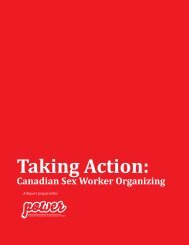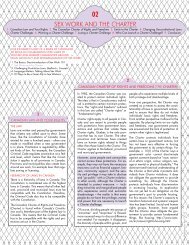challenging prostitution laws: bedford v. canada - POWER
challenging prostitution laws: bedford v. canada - POWER
challenging prostitution laws: bedford v. canada - POWER
Create successful ePaper yourself
Turn your PDF publications into a flip-book with our unique Google optimized e-Paper software.
2<br />
The BASIS FOR BEDFORD V. CANADA<br />
This case is about whether these three criminal <strong>laws</strong><br />
related to <strong>prostitution</strong> will be removed from the<br />
Criminal Code of Canada. Beyond that, the case is<br />
about different things to different people:<br />
· Moving towards decriminalization, which also means<br />
different things to different people. For Stella,<br />
decriminalization means the removal of all criminal <strong>laws</strong><br />
that prohibit selling, buying or facilitating (procuring) sex<br />
work.<br />
· Advancing sex workers’ fundamental rights: the right<br />
to share our earnings with whomever we choose; the<br />
right to contract for services; the right to determine and<br />
communicate the conditions and contexts in which we<br />
have sex; the right to discuss working conditions; the<br />
right to access existing labour protections; and the right<br />
to live free from fear that we can be criminally<br />
prosecuted because of the work we do.<br />
· Invalidating <strong>laws</strong> that are one of many systemic tools<br />
that contribute and reinforce inequality, disadvantage<br />
and discrimination based on class, race, gender,<br />
citizenship status, mobility and mental health.<br />
· Individual rights such as privacy rights, and the right<br />
to sexual autonomy and protection from government<br />
interference “in our bedrooms.”<br />
· The coherency of the law: The bawdy-house law says we<br />
can’t work indoors while the communicating law prevents<br />
us from working outdoors.<br />
· For Stella, this case is about all of these realities, and more…<br />
Possible Outcomes of Bedford v. Canada:<br />
If sex workers win this case entirely, the <strong>laws</strong> will be “struck-down”<br />
– meaning they will be removed from the Criminal Code and police<br />
will no longer be able to use these <strong>laws</strong> to arrest sex workers,<br />
clients or third parties.<br />
If sex workers lose the case, the <strong>laws</strong> will remain in the Criminal<br />
Code and will continue to be used to arrest us, the people we<br />
work with and the people who buy our services. Moreover, if the<br />
court decides that these <strong>laws</strong> are constitutional, we would not be<br />
able to challenge these same <strong>prostitution</strong> <strong>laws</strong> using the Charter<br />
rights used in Bedford. A completely new Charter challenge<br />
would need to be launched, one that would use a different Charter<br />
right, for example the s. 15 equality right. Also, this decision<br />
could reinforce public perspectives that legitimize the discrimination<br />
and stigma faced by sex workers.<br />
Finally, the decision could be a messy mix of both: The SCC could<br />
“strike-down” some of the <strong>laws</strong>, keep others in effect, or modify<br />
them.<br />
All people in Canada have certain rights that are protected by<br />
the Canadian Charter of Rights and Freedoms (Charter). If a government<br />
law or action violates an individual’s protected Charter<br />
right, the person whose right is violated can try to initiate a Charter<br />
challenge. This means taking the government responsible for<br />
the law or action to court.<br />
The individual or group who launches the Charter challenge is<br />
called the plaintiff(s) or applicant(s). The plaintiff(s) has to demonstrate<br />
in court how the challenged law or practice violates their<br />
Charter right(s). At the base of every challenge is a specific law(s)<br />
or practice that is contested and a specific Charter right(s) that the<br />
plaintiff(s) considers to be violated.<br />
For more information on Charter Challenges, see Stella’s Info-<br />
Sheet: Sex Work and the Charter.<br />
In the Bedford case, the <strong>laws</strong> being challenged are criminal <strong>laws</strong>.<br />
In Canada criminal <strong>laws</strong> are federal – which means the same<br />
criminal <strong>laws</strong> apply in all provinces and territories across Canada.<br />
In the Bedford case the applicants sued the federal government,<br />
as they are responsible for the criminal <strong>laws</strong>.<br />
PROSTUTION LAWS in the CANADIAN CRIMINAL CODE<br />
CHALLENGED in BEDFORD v. CANADA<br />
CC s. 210(1)<br />
Keeping a<br />
common<br />
bawdy-house<br />
CC s. 212(1)(j)<br />
Procuring<br />
Everyone who keeps a common bawdy-house<br />
is guilty of an indictable offence and liable to<br />
imprisonment for a term not exceeding two<br />
years.<br />
Landlord, inmate, etc.<br />
(2) Everyone who<br />
(a) is an inmate of a common bawdyhouse,<br />
(b) is found, without lawful excuse, in a<br />
common bawdy house, or<br />
(c) as owner, landlord, lessor, tenant,<br />
occupier, agent or otherwise having<br />
charge or control of any place, knowingly<br />
permits the place or any part thereof to<br />
be let or used for the purposes of a common<br />
bawdy-house, is guilty of an offence<br />
punishable on summary conviction.<br />
CC s. 212(1)(j) Everyone who lives wholly or<br />
in part on the avails of <strong>prostitution</strong> of another<br />
person, is guilty of an indictable offence and<br />
liable to imprisonment for a term not exceeding<br />
ten years.<br />
CC s. 213(1)(c)<br />
Offence in<br />
relation to<br />
communication<br />
Every person who in a public place or in any<br />
place open to public view stops or attempts<br />
to stop any person or in any manner communicates<br />
or attempts to communicate with<br />
any person for the purpose of engaging in<br />
<strong>prostitution</strong> or of obtaining the sexual services<br />
of a prostitute is guilty of an offence punishable<br />
on summary conviction.<br />
Published in April 2013<br />
2







